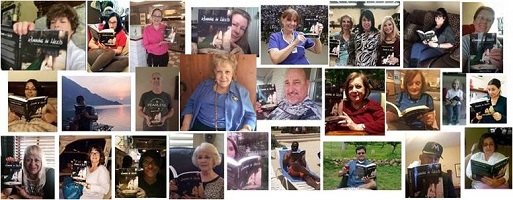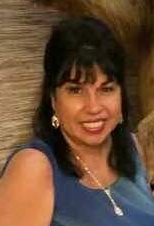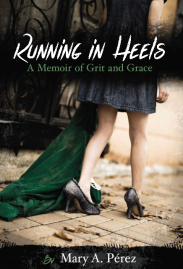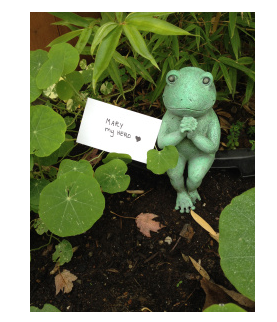At 5’2”, Grandma was a pleasantly plump woman with a round face and full lips. She had a light olive complexion, and wore reading glasses that sat on a nose “too fat” she often complained. Her soft, wrinkled skin smelled like Jean Naté.
My grandma’s name was Ana, born in 1898, the second of six siblings. She worked as a secretary for a steamship company, typing and transcribing in Gregg’s Shorthand. She was soft-spoken, a temperate woman. I witnessed her faith in action. Seeing her on her knees by the bedside in prayer was the norm. She expressed love and devotion by being a “doer of the Word and not a hearer only,” forever willing to help others. Even during the times when I’d see her wincing from the pain in her knees and feet, she’d still stand over the stove, making treats to hand out, or writing cards and letters to encourage others.
Grandma suffered from arthritis and blamed the tight, pointy shoes she wore in her earlier years for causing her painful feet. All her current black shoes were odd-looking and clunky, like the ones she had worn a long, long time ago. I enjoyed playing in them as a youngster.
Clip-clop. Clip-clop. Grandma’s shoes echoed as I walked in them across the tile floor.
“Mary,” Grandma called to me, sitting at her sewing machine, rubbing her eyes. “You have good eyes, dear. Por favor, thread this needle for me.”
With one eye shut, I squinted, concentrating on the task of getting the string into that tiny hole.
Grandma wanted me to learn how to sew, but I preferred sitting on the floor, playing with her sewing stuff instead. I either sifted through the mason jars she kept filled with buttons of all sizes or rummaged through her large round tin can packed with spools of colorful threads. Inside also were porcelain thimbles, a pincushion, and even a wood-darning egg for sewing Grandpa’s socks.
The click-clacking of her sewing machine in the afternoons was soothing to my ears. Listening to her hum “His Eyes Are on the Sparrow” while she sewed, crocheted, worked in her flowerbed, or bathed me always ushered in a warm sense of belonging and well-being.
On wash days, Grandma ironed all bed sheets, linens, pillowcases, cloth napkins, and even Grandpa’s white hankies. I helped her to fold, but I knew I didn’t like ironing one bit.
“Mary, it’s good that you give me a hand,” Grandma said as she sprinkled water over a napkin before ironing it. “You must learn to do these things yourself one day,” she added.
Gonna get me a maid for that, I thought.
Overall, I liked helping Grandma with chores. She saved S&H Green Stamps that I enjoyed pasting into a book. She did many things differently from what I saw Mama do with her time. Even when she was busy, Grandma always took the time to talk to me. I liked studying her. I thought it funny the way her mouth moved, with her lips still closed, whenever she read. I marveled at how her fingers typed fast and hard on the keys of her black manual typewriter, wishing I could type like her.
In retrospect, Grandma liked my curious mind and eagerness to learn. When she gave me a small white leather Bible for my own, I felt special.
“Mija, have you been studyin’ your Bible verses?”
“Yes, ma’am. I learned it all.”
“Bueno, let’s hear it.”
“The Lord is my Shepherd . . .” I began. As promised, when I finished, she gave me a crisp, two-dollar bill.
Sometimes I watched Grandma in the kitchen cooking and helped by peeling carrots or potatoes using her peeler.
“It’s good that you pay attention, dear,” Grandma said, wiping the chicken grease from her hands on her apron.
“Why?” I asked, rubbing my eyes, burning from the onions.
“Señoritas must know how to cook. And you dun want to become vaga,” she replied in her broken English, throwing everything into a pot, adding milk.
“What’s vaga?” I asked.
“It means lazy. You dun want to be that; you’ll have a family to care for one day.”
My husband gonna have to help cook if he wants to eat, I mused.
At my grandparents’ house, I’d run about or play hide-and-seek as much as I wanted. Except maybe when I tried playing an April Fool joke.
I waited, crouched down low behind a chair, and listened for her. I thought myself witty and barely could keep from snickering. As her footsteps came closer, timing it just right, I sprang up with arms raised and yelled, “BOO!”
But it so happened that it was my grandpa instead.
He popped my enthusiasm, letting me know it was too early in the morning for such nonsense. He might have popped me on my bottom, too, if he hadn’t missed when I shot past him like a dart and hopped back into bed.
Years later, after Grandpa’s passing away, Grandma hadn’t a soul to depend on. Yet she never stopped doing good deeds for others.
Grandma often spoke with my mama regarding her own illness, insisting she wanted to be at home when it became her time to die and not be in a hospital.
I prayed that when God took Grandma home, He would help me to relinquish her. I didn’t want her to suffer anymore, but still found it difficult to let go. I knew I had to, and I knew I needed to, but I didn’t know how or if I could.
* * *
A horrific day for our country. In shock, I watched the Space Shuttle Challenger break apart and burn, seconds into its flight. Five men and two women lost their lives tragically for the good of all humanity. They lived their dream by serving others. I may not have known them personally, but they died as heroes.
Three months later, on April 3, 1986, sickness reduced an unsung hero to skin and bones as she lost her bout with cancer. She wasn’t affluent. Refined. Or famous. She was an eighty-eight-year-old Puerto Rican woman. My beloved grandma. And my heroine.
When Mama called me and told me about Grandma’s final moments, sobs stuck in my throat. She expressed how she had sat by my grandma’s bedside, terrified while listening to her breathing as it came in short, laborious rasps.
“Your grandma’s parting words were, ‘God is calling me now,’ and then she gazed up at the ceiling,” Mama spoke dolefully. “So, I asked her, ‘How do you know?’ but she didn’t speak anymore. She closed her eyes, and I held her close.”
My mother’s trembling voice jumbled in between her sobs. “I . . . told her that I loved her. And I said to her, ‘you carried me . . . for nine months.’”
I pictured that heart-rending moment, imagining Grandma’s gentle countenance and Mama struggling to convey her love. And I thought, Oh Mama, she carried you longer than nine months. My insides ached, knowing that in her heart and prayers, Grandma carried us all.
My grief came in waves. Looking back, I know God spared me from becoming hopelessly morbid and consumed with anguish. Grandma wouldn’t have wanted that. Knowing she no longer suffered, I believed her final heartbeat didn’t mean the end but the beginning.
I wanted to celebrate her life when I journeyed back to help with her memorial.
Once a plump woman, Grandma had lost so much weight in her final days. She had always loved a white Easter dress of mine and requested that we bury her in it. My dress fit her perfectly then. I also asked that everyone wear white instead of the customary black garments at her funeral.
White carnations—Grandma’s favorite flowers—covered her open casket. I stood, my eyes caressing her still face, now so thin. Vivid images of her life jumped into my thoughts. I saw her on her knees pleading with God to be merciful to her loved ones. I recalled the many prayers she offered in gratitude for another day. I pictured her lips moving wordlessly when she read her Bible, with her index finger pointing to the sentences across the worn-out pages. I could still hear the sound of her soft voice calling my name. I remembered the merriment of her laughter after listening to one of my silly jokes. I couldn’t blink away the hot tears that blinded me.
In my mind’s eye, Grandma came to me.
I could hear her.
Touch her.
Her love, her hugs, and her kisses embraced me.
We honored her memory and her passing from this life into the next.
A gentle breeze blew away the heat of the day; the sun hid behind the clouds. The scent of rain.
As it started to drizzle, my heart was comforted. Grandma always considered it a good omen if it rained on the day someone was laid to rest.
Before long, her coffin lay in a crypt next to her cherished husband, my grandpa.
At last, Grandma’s labors had ended. Thank God, she hurt no more.
(An excerpt from Running in Heels – A Memoir of Grit and Grace. A small tribute to my dear grandma, who passed away 27 years ago, whose birthday would have been this month.)
© M.A. Perez, 2013, All Rights Reserved














What a beautiful tribute to a special soul.
LikeLike
Thank you, Luanne. She meant the world to me …
LikeLike
Reblogged this on Memoir Notes.
LikeLike
Blessings to you, LaTanya!
LikeLike
I loved this. (Grandmas are special like that.)
LikeLike
So true, LaTanya! Please feel free to re-blog 🙂 And thanks!
LikeLike
Where would some of us be without Grandmas?
LikeLike
Goodness, what a powerful tribute to your grandma. “God is calling me now.” Those words would remain forever etched in my memory had anyone ever spoken them to me!
LikeLike
You and me both, Jack. My mom needed to be there during my grandma’s last breath for so many reasons. I certainly believe it was God’s plan all along.
LikeLike
I’ll never know how you do it!!!! My heartaches and hurts, God I not only missed them but oh How I need them…
LikeLike
I know how you miss them, Brother; we both do.
LikeLike
There really are no words…. This is the way I felt about my dear Mother. Very beautifully written, Mary Ann.
LikeLike
Liz, I appreciate both your feed back and your encouragement. Blessings!
LikeLike